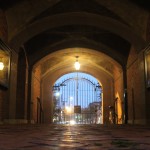by Nicole Chavez
A clenched fist. A firm handshake. A steady salute. All are associated with authority and accord. These gestures are the antitheses to the sweaty, limp handshake at the meeting between President Barack Obama and President Raul Castro on March 22nd. The encounter occurred eighty-eight years after the last visit a sitting American president has made to Cuba.
The history of diplomatic ties with the United States is one characterized by trauma. The now viral video of Obama and Castro’s handshake serves as a cautionary foreshadowing of the United States’ involvement with Cuba in the future.
In January 1961, the U.S. severed its diplomatic ties from Cuba. The embargo, officiated through the Helms-Burton Act, put a considerable strain on the island’s economy and its relation to Cuban-Americans in the United States. The embargo was reflective of the U.S.’s “rollback” policy of the early 1960s, which deployed economic sanctions and diplomatic isolation against leftist governments dependent on support from the United States.
Under the governance of Fidel and Raul Castro, Cuba has budged little in its obstinate refusal to compromise with the United States. However, in the last few years, Obama has realized the need for change in American dealings with Cuba.
On an island subject to severely restricted access to Internet and other sources of information, repression and detention of political activists and benign figures, and abject poverty and unemployment, the U.S.’s isolationist foreign policy does more harm than good. As Obama proclaimed in his State of the Union address in January 2015: “In Cuba, we are ending a policy that was long past its expiration date. When what you’re doing doesn’t work for 50 years, it’s time to try something new.”
Now working under the assumption that some change is better than none, the Obama administration must decide how to ensure that the Cuban government facilitates this reform movement on the island. Previously, the Cuban government used the embargo as a scapegoat, acquitting itself of any responsibility to implement proactive public policies and improve the quality of life for Cubans on the island. Now, the U.S. is forcing the Cuban government to be accountable for its own people.
Those against Obama’s recent foreign policy declarations contend that by easing the embargo and facilitating economic transactions between the island and the U.S., the U.S. will be sapping Cuba of its culture. Many Americans, hope to visit Cuba “before it changes.” They perceive Cuba as a tropical paradise that has remained frozen in time since the 1960s and fetishize the violent poverty that has seized the island.
The argument against U.S. involvement with Cuba is based in a paradigm of U.S. exceptionalism. To believe that U.S. trade with Cuba would destroy the remnants of old Cuba is to blatantly ignore the fact that other countries, particularly Spain and Portugal, established commercial ties with Cuba years ago. Just as with any place, the culture of Cuba is in constant flux. This does not devalue the island’s authenticity.
The future of Cuba and its relations with the U.S. remain unclear. Like Obama with his limp hand, the U.S. cannot do anything but proceed forward and take everything in stride.



